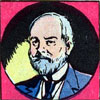Biography of Charles Reade

Charles Reade (1814 -1884).
IN THE last chapters of The Cloister and the Hearth, Charles Reade, the author, speaks of himself as rescuing Gerard and Margaret "from long and unmerited oblivion." These two, the hero and heroine of his tale, are in real history the parents of Erasmus (1466-I536), who was the greatest humanist of the Renaissance period and the first "man of letters" in Europe after the many centuries that had passed since the fall of the Roman Empire. The little Gerard of the novel grew up to become a major personality and force in the revival of learning and the revival of the enjoyment of life, which had disappeared during the so-called Dark Ages, and came to life in the Renaissance.
Like the parents of many another famous man, the parents of Erasmus were forgotten by history, until Charles Reade came upon the story in old Latin manuscripts and in Erasmus' own writings.
Taking what facts he could find, after a tremendous labour of research and documentation, Charles Reade wove them into this novel, which is considered his masterpiece, and one of the best historical novels ever written. Reade was proud of the amount of historical information included in the work. All the customs of Holland, Germany, Burgundy, and Italy which are pictured in the novel give a graphic view of the manners and beliefs of European peoples in the fifteenth century. Much of the plot is based on the inhuman custom, in practice at the time, that priests could not marry.
Several of the six novels he wrote before The Cloister and the Hearth are concerned with social injustices in Reade's own lifetime, and which he so greatly hoped to reform. It's Never Too Late to Mend is about the abuse of prisoners and the treatment of criminals in England. Others deal with abuses in lunatic asylums, trade unions, and the degrading conditions of village life.
Charles Reade was born June 8, 1814 at Ipsden, Oxfordshire, England, the son of an English squire. After graduating, with honors, from Magdalen College, Oxford, he became a scholar there, and rose to the position of Dean of Arts. In 1842, he was called to the bar. He became a dramatist, and wrote many popular plays before he turned to writing novels as well. He lived most of his life in London.
When he died, April 11, 1884, he left his vast collection of notes and research open to the public, so that other writers could study his methods. Reade's writing is sometimes compared to that of his French contemporary, Zola, and to those of his English contemporary, Charles Dickens, because of its realism.